Module 2 Experiences
八年级英语下册Module2Experiences模块主题写作习题pptx课件新版外研版

【高分作文】 ________________M__y_H__o_li_d_a_y_i_n_B__e_ij_in__g_______________ ________B_e_ij_i_n_g__is__i_n__th__e_n_o_r_t_h__o_f__C_h_i_n_a_._T__h_e_r_e__a_re___ ___m__a_n_y_p__la_c_e_s_o_f__in_t_e_r_e_st__th__er_e_._A__l_o_t_o_f__p_e_o_p_le__g_o__to___ ___v_i_si_t_B_e_i_j_in_g__e_v_er_y__y_e_a_r.___________________________ ________I__h_a_v_e__b_e_en___to__B__e_ij_in_g___m_a_n_y__t_i_m_e_s_._I__h_a_v_e___ ___t_r_a_v_el_l_ed__a_r_o_u_n_d__B_e_i_ji_n_g_._________________________
三、素材积累 1. 描述个人经历的常用词汇:
ever // how // arrive // where // when // take photos // shopping // enjoy oneself // go to... by... // look forward to...
2. 描述个人经历的常用句型: 开头句 1. Have you ever been ...? 2. I’d like to tell you my travel experience in ...
____I__h_a_v_e___cl_i_m_b_e_d___th__e__G_r_e_a_t__W__a_l_l __a_n_d__v_i_s_it_e_d__t_h_e___ ____S_u_m__m__er__P_a_l_a_c_e_a_n_d__t_h_e__P_a_la_c_e__M__u_s_eu__m_._I__h_a_v_e__a_ls_o___ ____h_a_d__c_o_n_v_e_r_sa_t_i_o_n_s_w_i_t_h_f_o_r_e_ig_n_e_r_s_a_n_d__h_a_v_e__ta_k_e_n__lo_t_s___ ____o_f_p_h_o_t_o_s_. ________________________________________ _________B_e_ij_i_n_g_i_s_a__b_e_a_u_t_if_u_l_a_n_d__o_ld__c_it_y_._I_a_m___p_ro_u__d_o_f___ ____i_t _a_n_d_I__lo_v_e__it_v_e_r_y__m_u_c_h_.___________________________
外研社八年级英语_Module_2_Experiences_知识点外研社(新标准)

Module 2 Experiences(一)重点单词[单词学习]1. experience n. 经验(不可数),经历(可数)【例句】She has little experience because she has worked for only one month.He had many interesting experiences while travelling in Africa.[考题链接]Mr. Guo is a teacher of much teaching__________(经验).【用法】用作动词,表示“体验”“经历”等。
【例句】He experienced a great adventure.2. kind n. 种类;adj. 仁慈的,和善的【用法】all kinds of 各种各样的【例句】There are all kinds of animals in the zoo.It’s kind of you to invite me to your party.注意:This kind of books is very good.这类书都很不错。
(把这类书看作一个整体)3. problem n. 问题,难题【考查点】辨析:problem 与questionproblem指说话者认为难以解决的问题,它与动词solve或settle(解决)搭配。
而question指说话者需要寻找答案的问题,它常与动词ask或answer连用。
【例句】The problem is difficult to solve.May I ask you some questions?[考题链接]They have some ________ about getting there.A. questionsB. problemsC. questionD. problem答案:B解题思路:要完成以上题目,必须了解question和problem的区别,从而选择正确答案。
2020-2021学年八年级英语外研版下册Module2Experiences教案

(一)导入新课(用时5分钟)
同学们,今天我们将要学习的是Module 2 Experiences这一章节。在开始之前,我想先问大家一个问题:“你们在假期中有没有去过什么特别的地方?”这个问题与我们将要学习的内容密切相关。通过这个问题,我希望能够引起大家的兴趣和好奇心,让我们一同探索旅行经历的奥秘。
-学生需要学会在语境中使用这些词汇,如描述旅行的舒适度或某次经历。
(3)口语交流:能够询问和回答关于旅行经历的问题,进行简单的交流。
-学生需要掌握提问和回答的句型,如:“Have you ever been to...?”(你曾经去过……吗?)和“Yes, I have./No, I haven't.”(是的,我去过。/不,我没去过。)
2020-2021学年八年级英语外研版下册Module 2 Experiences教案
一、教学内容
本节课选自2020-2021学年八年级英语外研版下册Module 2 Experiences。教学内容主要包括以下章节:
1. Unit 1: He has been to the Great Wall.
-讨论过去旅行经历。
-学习使用现在完成时描述过去发生且与现在有关的动作。
2. Unit 2: It was very comfortable.
-描述过去假期中的活动。
-继续巩固现在完成时的运用。
3. Unit 3: Language in use.
-综合运用本模块所学语法、词汇和表达,进行口语交流。
三、教学难点与重点
1.教学重点
(1)核心语法:现在完成时的结构和用法,包括动词过去分词的变化规则。
-学生需要掌握“have/has +过去分词”结构,并能正确应用于描述过去发生的、与现在有关联的动作或经历。
外研版八年级上课文带翻译MODULE 2 Experiences

MODULE 2 Experiences模块2 经历Unit 1Have you everentered a competition?第一单元你曾经参加过竞赛吗?Tony:So what's your penfriend's name, Lingling?妥尼:你的笔友叫什么名字,玲玲?Lingling:Sally Maxwell,and she's from ParkSchool in London.玲玲:萨利·麦克斯韦,她来自伦敦的花园学校。
Tony:Has she visitedChina before?妥尼:以前她已经来过中国了吗?Lingling:No, she hasn't.But I sent her a DVDabout China and she'swatched it.玲玲:不,没有。
可是我寄过一张关于中国的DVD给她。
她已经看过了。
And she has enjoyed mymessages about my lifehere in Beijing. So Ithink she'll like ithere.玲玲:她喜欢知道我在北京这生活的消息。
所以我认为她会喜欢这儿的。
Tony:What about you,Lingling? Have you everwanted to travel aroundthe world?妥尼:你呢,玲玲?你曾经想过要环游世界吗?Lingling:Yes, I have.I've always wanted to goto the USA and Europe.玲玲:是的,我想过。
我始终想去美国和欧洲看看。
And Sally has invited meto stay with her inEngland one day. Theproblem is the price ofthe ticket.萨利已经邀请我某一天去英国和她呆在一起。
Module 2 Experiences 教案

Module 2 ExperiencesUnit 1 I’ve also entered lots of speaking competitions.【教材分析】本课为Module 2的第一单元,主要内容为运用现在完成时来描述自己和他人的经历,例如演讲比赛经历、旅行经历等。
从全书来看,本单元承接下一模块现在完成时的学习和运用,内容有层次的展开,学生容易接受。
通过对本模块的学习,为下一模块的学习奠定了语言基础。
【教学目标】Knowledge objective:1. 词汇: ever, enter, competition, prize, dream, afford, pity, invite2. 现在完成时的结构和定义。
Ability objective:能听懂和阅读关于介绍经历的语言材料,能通过相关词汇和图片描述自己和他人的经历;能初步运用现在完成时,并写出相关的句子和短文。
Moral objective:乐于介绍自己的经历,和他人分享。
同时,学会倾听他人的美好的经历,理解他人的喜怒哀乐,建立良好的人际关系。
【教学重点】1. 重点短语和单词。
2. 现在完成时的运用。
【教学难点】1. 现在完成时的结构运用。
2. 现在完成时的不规则动词。
【教学方法】PWP method, task-based method and interactive approach【教学手段】A tape recorder, multimedia and some pictures【教学过程】Teaching Procedures:Step 1 Lead in1. Ss watch the video and answer “What’s this video about?”2. Ss look the pictures and answer the questions.Step 2 Consolidate new wordsLook and say. The teacher shows the pictures of new words and let the students to say as quickly as possible.Step 3 Listen and number the words as you hear them1.Look at the words first.2.Then listen to the tape and number the words.Step 4 Listen again and choose the correct answer1.Look at the three sentences carefully.2.Listen to the tape again and choose the correct answer.Step 5 ReadingListen and read, then answer the two questions:1. What is Lingling entering?2. Who is going to enter the writing competition?Step 6 Work in pair.1. Work in group. Make a competition to find who can find out the most sentences which are thepresent perfect tense.2. Read Part 3 and check what Linging and Tony have or have not done.3. Work in pairs. Ask an answer questions about what Linging and Tony have or have not done. Step 7 Everyday EnglishMaster the main sentences in the passage.Step 8 Language pointsSs should master the main points from the passage in Part 3. If possible, let the students to say at first.1. I am entering a competition.我正参加一个比赛。
八年级上册Module 2 Experiences讲解

Module 2 Experiences一、一周课程概述在这一模块中我们要完成以下学习任务:1.掌握现在完成时的基本概念和结构。
2.掌握动词过去分词的规则变法和记忆一部分特殊单词的过去分词形式。
3.会用现在完成时的简单句子进行交流。
4.本周需要掌握的单词有:experience, ever, competition, airport, cabin, steward, captain, country, before, problem, wonderful, prize, reckon, sound, brilliant, dream, someone, kind, western, abroad, fantastic, anywhere, Chinatown, Italian, delicious, pizza, sandwich, sell, musician, dagger, seat, beside, taste, only, yet, stone, climb, roast, palace, another, seafood, entertainment, time, name5.本周需要掌握的短语有:take off, come true, more than, sell out二、音标的学习:朗读下列音标组合及相关单词:三、重点知识归纳及讲解1.experience n. 经验[U];经历[C]e.g.Does she have much experience of teaching?她教学经验丰富吗?He had many interesting experiences while traveling in Africa.他在非洲旅行时,有许多有趣的经历。
2.ever adv.曾经(用于疑问句中的完成时态)e.g.Have you ever seen an elephant?你曾经见过大象吗?Yes, I have.见过。
外研版八年级下册英语《Module2Eperiences》说课稿
外研版八年级下册英语《Module 2 Eperiences》说课稿一. 教材分析外研版八年级下册英语《Module 2 Experiences》是一篇以描述人们在不同情境下的经历为主题的模块。
本模块通过几个相关的故事,让学生学会如何用英语描述过去发生的事情,以及如何表达自己的感受和看法。
本节课的主要内容是学习如何用英语描述一次难忘的经历。
二. 学情分析八年级的学生已经掌握了一定的英语基础知识,能够运用简单的英语进行日常交流。
但是,他们在表达自己的感受和看法方面还存在一定的困难,尤其是在描述复杂的情境和细节时,往往会出现语言表达不清、逻辑混乱的问题。
因此,在教学过程中,需要注重培养学生的语言表达能力和逻辑思维能力。
三. 说教学目标1.知识目标:让学生掌握描述过去发生的事情的基本句型,学会如何用英语表达自己的感受和看法。
2.能力目标:培养学生运用英语进行口头和书面表达的能力,提高他们的语言运用能力。
3.情感目标:通过描述自己的经历,培养学生积极面对生活中困难与挑战的态度,增进同学之间的友谊。
四. 说教学重难点1.教学重点:让学生学会用英语描述过去发生的事情,并能够表达自己的感受和看法。
2.教学难点:如何引导学生运用英语准确、清晰地表达复杂的情感和看法。
五. 说教学方法与手段1.教学方法:采用情境教学法、交际教学法和任务型教学法,让学生在真实的语言环境中学习英语。
2.教学手段:利用多媒体课件、图片、故事等教学资源,激发学生的学习兴趣,提高他们的学习积极性。
六. 说教学过程1.导入:通过展示一组图片,让学生描述图片中人们的行为和表情,引出本节课的主题——描述一次难忘的经历。
2.新课呈现:教师讲述一个自己的难忘经历,引导学生用英语进行表达,并板书关键词和句型。
3.课堂活动:学生分小组,根据提供的图片和关键词,用英语讲述自己的难忘经历,教师巡回指导。
4.口语练习:学生模拟情景,两人一组,用英语描述一次难忘的经历,注意语言的连贯性和准确性。
外研版英语八上《Module 2 Experiences》课件
动词原型 动词过去时 动词过去分词
want – look – watch – invite -enter --
wanted – wanted looked – looked watched – watched invited – invited entered – entered
现在完成时
肯定形式:主语(sb.) +has / have + v.过去分词(done) .
Welcome!
Module 2 Experiences
Have you had your breakfast? 你吃了早餐了吗?
I had my breakfast at 7:00. I have seen a paper in yesterday’s newspaper. 这篇文章我在昨天的报纸上看过了。
Have you ever entered an English writing competition ?
Yes, I have . / No, I haven’t .
It has started a new competition.Байду номын сангаасAnd the winner can go to England .
They haven’t looked at today’s newspaper . 他们还没看今天的报纸。
He has never visited Nanhai . 他从来没来过南海。
Practice
1、I __h_a_v_e_n_’_t _e_n_t_e_re_d_ any __h_o_t_e_ls___ . 我没有进过任何的酒店。
3、He __h_a_s__ _e_n_j_o_y_e_d_ the modern life . 他很享受现代的生活。
Module2 Experiences
外研社八年级上Module2 Experiences (Revision)教学目标备课人:张盈新知识目标:1.本模块重点词汇,短语及句式. 2.掌握现在完成时定义一的用法能力目标: 运用所学语言知识交流,能够向他人介绍自己的经历.情感目标: 进一步增强民族意识,热爱中国的文化与名胜.教学重难点1.掌握词汇,短语及句式.2.理解并正确运用现在完成时.课前朗读短语:enter a competition ,take off ,come true,sell out ,message about my life.,around the world =all over the world , invite sb. to do sth. the price of the ticket, a wonderful/fantastic experience, the first prize , dream of=dream about, fly to=take a plane to , try westen food, have Italian food, more than=over, too cold, at the end .句式: Have you ever entered a competition?Has she visited China before?Have you ever wanted to travel around the world?It sounds brilliant!一,整理知识点笔记()1.a fantastic experience 中的experience意思是____ 是可数名词吗?____它的另一个意思____,是可数名词吗?____ /s?wd=fantastic&dt=explain2. invite sb. to do sth. 中invite 后接动词不定式,还有那些动词后面接to do ,____________________3. It sounds brilliant!中的sound 是___动词,意思是____。
Module 2 Experiences全模块课件(外研版八上)
ABC式
show sing speak swim take throw wear write showed sang spoke swam took threw wore wrote shown sung spoken swum taken thrown worn written
1. 表示发生在现在以前的 某个未明确的时间里,目 前已经完成或结束的动作 或状况,这种行为或状态 对目前有影响。
☺not travel all over China Miss Zhong hasn’t travled all over China.
☺not try Indian food Miss Zhong hasn’t tried Indian food. ☺not live in another country Miss Zhong hasn’t tried lived in another country. ☺not write a poem or story Miss Zhong hasn’t written a poem or story.
begun build
broken burn burnt chosen done
buy
catch
bought bought caught caught
do
ABC式
ABB式
说出下列动词的过去式和过去分词:
put
cost cut put put
become
became become came come
cost cost cut let cut let hurt hurt
come
hurt
let
AAA式
ABA式
ABC式
be begin break choose do draw drink drive eat fall was/ were began broke chose did drew drank drove ate fell been begun broken chosen done drawn drunk driven eaten fallen
- 1、下载文档前请自行甄别文档内容的完整性,平台不提供额外的编辑、内容补充、找答案等附加服务。
- 2、"仅部分预览"的文档,不可在线预览部分如存在完整性等问题,可反馈申请退款(可完整预览的文档不适用该条件!)。
- 3、如文档侵犯您的权益,请联系客服反馈,我们会尽快为您处理(人工客服工作时间:9:00-18:30)。
Module 2一、语法( )1. 1. Has your brother ever been to Shanghai _____?A. afterB. whenC. beforeD. this time.( )2. —The film Harry Potter is really interesting. —Yeah, I _____ it twice.A. have seenB. seeC. will seeD. has seen( )3. Have you ____ spoken to a foreigner?A. stillB. alreadyC. everD. yet( )4. Have you _____ today’s newspaper?A. seeB. look atC. readD. watched( )5. —Have you ever been to Beijing? —_____. I went there last year.A. Yes, I didB. Yes, I haveC. No, I haven’tD. No, never ( )6. —Have you found your bag? —____.A. No, you haveB. Not yetC. Yes, I doD. Yes, I found ( )7. My parents have ____ visited the Great Wall?A. alreadyB. beforeC. didD. done( )8. —Have you watched the film before? —No, _______.A. neverB. haven’tC. everD. once( )9. —_____Bill ____ his homework? —Yes, he has.A. Did; finishB. Have; finishedC. Has; finishedD. is; finishing ( )10. —Where’s his friend? —He ____ Japan.A. has gone toB. has been toC. will go toD. went to二、单词拼写1.As we know, he got the first p________ in the contest.2.Will you t______ by air or by train?3.I shall e_______ the singing competition.4.I’ve never heard of that _______(以前).5.The Spring Festival is coming, and the children are c_________ down the days.6.I like your school in Beijing, but I’m not feeling very well at the m________.7.English names are d________ from Chinese names.8.If you become famous, people all o_______ the world will know you.9.If she works far away, she will m_______ her family.10.O______ loud music can make him start to be excited.11.Mother is ______ (做)lunch in the kitchen.12.Thank you very much for _________(邀请)me to your birthday party.13.—Have you e_______ spoken to a foreigner? —No, never.14.—What’s your d_____? —To be a doctor one day.15.The car is very expensive. I can’t a________ it.三、单项选择( )1. He did as his teacher told him and _____ the first place in the exam.A. wonB. beatC. lostD. win( )2. —Don’t ____ about our spoken English. We will work hard to improve it this term.—OK.A. thinkB. worriedC. worryD. be worrying( )3. If we try our best, our dream will come true ________.A. one dayB. any dayC. at timeD. some other day( )4. Class is beginning. Please stop _______.A. talkingB. to talkC. talkD. talks( )5. Mrs. Wang always asks us to ______ conversations in the English class.A. make upB. turn upC. end upD. look up( )6. Her family ______ all music lovers.A. amB. areC. isD. was( )7. I was happy. He sent a present _____ me for my birthday.A. inB. atC. forD. to( )8. ______ Greens are preparing for the coming Thanksgiving Day.A. /B. AC. AnD. The( )9. Ben is a foreign teacher. So far, he ______ in Shanghai for five years.A. was teachingB. has taughtC. will teachD. taught( )10. She hoped nothing bad would happen ______ him.A. onB. toC. inD. for( )11. The old man live ______ the hill. But he don’t feel lonely.A. at the topB. at the top ofC. on the topD. in the top of( )12. —Look, how beautiful the skirt is! —Yes, but it’s too ______ for me.A. expensiveB. highC. cheapD. low( )13. I like flowers. I hope to study at a school _____ many flowers and trees in it.A. inB. withC. onD. by( )14. —______ do the children take art lessons a week? —Three or four times.A. How longB. How many timesC. How soonD. How often ( )15. The teacher had to keep the man ________ for an hour.A. to waitB. waitedC. waitD. waiting( )16. Try to sing more English songs, and you will find it interesting _____ a foreign language.A. learningB. learnsC. to learnD. learn( )17. —I’m looking forward to _____ my parents soon. What about you? —Me too.A. seeingB. seeC. sawD. sees( )18. —Why did you get up so early? —_____ the first bus.A. CatchB. CatchingC. To catchD. Caught( )19. A ____ girl named Dong Xinyi looked after her disabled(残疾的) father.A. three-year-oldB. three-years-oldC. three years oldD. three-years old ( )20. —I will go to the countryside to see my grandmother this afternoon, so I can’t go swimming with you.—______.A. It’s my pleasureB. You are welcomeC. That’s a pityD. Sure, I am四、用方框在单词的正确形式填空1.He often dreams of _________ a scientist.2.They walked because they couldn’t afford _______ a taxi.3.Astronauts(宇航员)don’t like to be called _________.4.Did you enjoy ________ to the light music.5.—What do you think of the new book?—It’s _______ one I have ever seen.6.Has Li Lei ever ________ to his friend in English.7.This pair of shoes ______ too small for me. Please show me another pair.8.Is there anything new in ________ newspaper?9.Put sugar and water in the bowl and mix ________ up.10.Julia isn’t going to the cinema with us because she has seen the film ________.五、完成对话A: How long have you stayed 1_______ Qinhuangdao?B: I have 2______ here for two years since my 10th birthday.A: Then have you ever 3_______ our capital city, Beijing?B: Yes, my parents 4_______ me to Beijing last year.A: That must 5________ very interesting.B: Of course, I have visited several 6_______ of interest in Beijing.A: Can you name some of them?B: I have been to Tian’an men Square, Beijing World Park and the Great Wall.A: Oh, you 7________ climbed the Great Wall! 8______ lucky you are! I’m always dreaming about going to Beijing, but…B: You will visit 9_______ some day, I’m 10_______.六、完形填空It was my first day at Grade 6. And the first lesson was 1 English. When I was doing nothing, Mr. Gough, our new English teacher, 2 into the classroom.To my surprise, he held up a book, The collected Works of Edgar Allen Poe , and asked if anyone 3 it. I put my hand up, because Poe was my favorite writer. Mr. Gough asked if I really understood 4 the author(作家)tried to say in his book. My reply made him smile, and he asked me 5 an essay(文章)on that subject.After that, English classed became a new interest for me. Mr. Gough thought that students had to 6 a play to understand it. “Don’t just read it,” he said.As time passed, we developed a real friendship. He encouraged(鼓励)me to be a 7 in the future. When I left school, he said to me, “You have a gift for writing, Tony, and one day you’ll come to realize how 8 it is. Make use of it if you want your life to be complete.”9 have passed. Now, every time I sit down to write 10 , I think of Mr. Gough. He七、书面表达请你介绍一下游览北京的经历,内容如下:1.北京在中国的北方,每年有很多人到北京来旅游;2.来过北京多次,跑遍了北京城;3.爬过长城,到过颐和园和故宫;4.拍下了很多照片,与外国人用英语交谈过。
